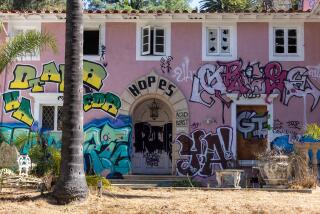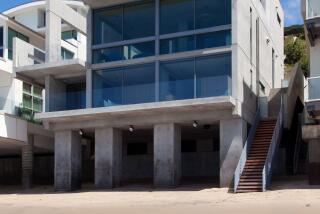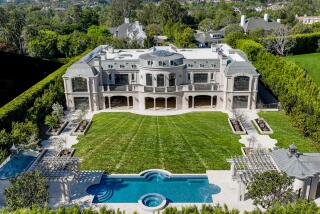Massive reduction in value of Bel-Air mega-mansion sparks question over what defines ‘ultra-high-end luxury’

Real estate tycoon Mohamed Hadid once boasted that a luxurious mega-mansion he was building in the hills of Bel-Air would sell for more than $100 million.
Hadid, known for his lavish homes and stints on reality television, chronicled the progress of construction on Instagram. In one post, he billed a cavernous space where workers were laying rebar as “home for the next largest IMAX home theater in the world.” In others, he showed off Italian marble, a Moroccan room and a “modern yet classic” Turkish bath.
Led in part by those statements, the county eventually valued the home under construction at more than $70 million.
But as Hadid faced delinquency on a hefty tax bill for the still-unfinished mansion, he asserted the property was instead worth just $10 million.
Last month, the county reassessed the property at close to $29 million, saving Hadid half a million dollars a year in property taxes.
The question of how much the colossal home is worth opens a window into the rarefied world of high-end real estate in Los Angeles, where developers compete in Bel-Air, Brentwood and Malibu to build the biggest, most extravagant and most expensive homes.
Despite the sweeping size and prized details of Hadid’s house, some county officials questioned whether it was truly “ultra-high-end luxury” construction.
The decision to drop the value drew scrutiny from John Loew, a deputy assessor seeking to unseat Assessor Jeffrey Prang in the November election. “Everybody should pay their fair share of taxes,” Loew said. “The perception of the public is that these celebrities get special treatment.”
Robert Kalonian, spokesman for the assessor, said that wasn’t the case at all and that appraisers had based the lower value on new information that came to light in the battle over the Bel-Air property.
Bruce Rudman, an attorney for Hadid, said $41.8 million — the amount that pushed the property’s assessed value past $70 million — should never have been added by an assessor last year, calling it “a gross error.” Even without it, he contended, the assessment was not justified.
“The value as stated on the assessment is excessive, particularly with regard to the incomplete construction,” Rudman said.
The tussle over taxes is the latest development in the saga over the Bel-Air behemoth, which became a flashpoint amid booming post-recession construction on the Westside.
Neighbors complained that the massive home on Strada Vecchia Road, which some dubbed the “Starship Enterprise,” had destabilized the surrounding hillside. City officials ordered a halt to construction and ultimately revoked the project’s permits. Prosecutors alleged that the mansion was bigger and taller than city rules allowed and included entire areas that were never approved.
Hadid and his project manager insisted city inspectors were aware of changes during construction. But Hadid pleaded no contest last year to criminal charges tied to illegal construction on the property. He was sentenced to three years’ probation, thousands of dollars in fines and 200 hours of community service.
As for the hillside, “there is no danger of the house falling down the hill — zero danger,” Rudman said. “There is some loose soil that needs to be remediated ... and there is a slope stabilization plan” awaiting approval to do so.
The developer is also facing a civil lawsuit from neighbors demanding that he tear down all unapproved construction and restore the hillside. Hadid has sued back, alleging attempted extortion by his neighbors.
As he faced an overdue bill for taxes on the property, Hadid lodged appeals with the Los Angeles County Assessment Appeals Board, arguing that appraisers had overstated the value of the unfinished site.
Late last year, appraiser Rachel Geist estimated that new construction on the land in 2017 was worth $41.8 million, bringing the total value of the property to more than $70 million. In a memo reviewed by The Times, she cited claims in media reports and on Hadid’s Instagram account that the property would be worth $100 million upon completion, span 30,000 square feet and feature an Imax theater.
“Due to the unique nature of this property and craftsmanship/detailing as well as location and off-hill construction, standard costing amounts do not apply,” she wrote in the memo.
In a 2018 memo she reaffirmed her estimate. The memo described details such as flooring in a “Moroccan room” that appeared to be “antique, possibly imported.”
Hadid’s appeals have yet to be scheduled for hearing by the appeals board, an independent entity.
But in August, appraisers signed off on dropping the property’s total value, including the land and unfinished home, to about $29 million, according to records provided by the assessor’s office.
The change will save Hadid $1 million in general property taxes and municipal levies owed for 2017 and 2018. Taxes on the property are delinquent, according to the assessor’s office.
Rudman said he was looking into the tax matter. “My understanding is all the property taxes have been paid,” he said.
In a memo explaining the change, appraiser Laura Booth said the $41.8-million increase had been erroneously added. She said new construction on the site was “not an ultra-high-end luxury improvement” and noted the owner would have to demolish some of it under the terms of his plea.
In interviews, Kalonian, assistant assessor George Renkei and supervising appraiser Milan Garcia said “ultra-high-end luxury” was a subjective term defined in relation to a scale set by the market — essentially a you’ll-know-it-when-you-see-it type of standard. They also said the cost and quality of materials, with some custom-made or imported, would be a factor.
The trio said previous assessments had consisted largely of guesswork, because appraisers weren’t allowed onto the property and there were few comparable homes to use as benchmarks.
But after the appeals were filed, appraisers were allowed onto the project site, leading them to reconsider their estimates, Kalonian said.
“The property as it stands now is not the property that we believed was being built,” he said, describing it as simply “luxury” instead of “ultra-high-end luxury” and pointing out that the size and features of the property would have to be scaled back to comply with the plea.
When asked about the chain of events, deputy assessor Loew said the county appeared to have helped Hadid.
Loew said appraisers shouldn’t have given any credit for demolition until they could verify the property had actually been demolished, because in the meantime the developer could still get value from the illegal construction but not pay taxes on it. Guidelines for valuing properties instruct appraisers to verify a property has been demolished before deducting its value, Loew said.
But Renkei said the overarching standard for assessing a property is “market value,” defined as what a buyer is willing to pay a seller on the market.
If a property owner builds an addition to his home and appraisers boost the home’s value assuming that the new construction is permitted, Renkei said, they will take the value back off once they find out it’s illegal and must be torn down.
Buyers “know this when they’re purchasing the property, so they’re not going to give you value for that improvement because they know it’s worthless,” he said.
Ignacio Rodriguez, an architect for the Bel-Air property, said builders have torn down a portion of a pool deck and begun separating the pool from the main structure “to show the city in good faith that we were trying to comply.”
Department of Building and Safety records show the property owners are still correcting plans to bring them in line with city rules.
Joseph Horacek, a neighbor who is suing Hadid, said he didn’t think Hadid was getting an undue benefit from the reassessment.
“The house is totally illegal, and he has destabilized the hillside and created great risk to the surrounding properties,” Horacek said. In light of that, “the house was over-assessed.”
Twitter: @AgrawalNina
Twitter: @AlpertReyes
More to Read
Sign up for Essential California
The most important California stories and recommendations in your inbox every morning.
You may occasionally receive promotional content from the Los Angeles Times.












